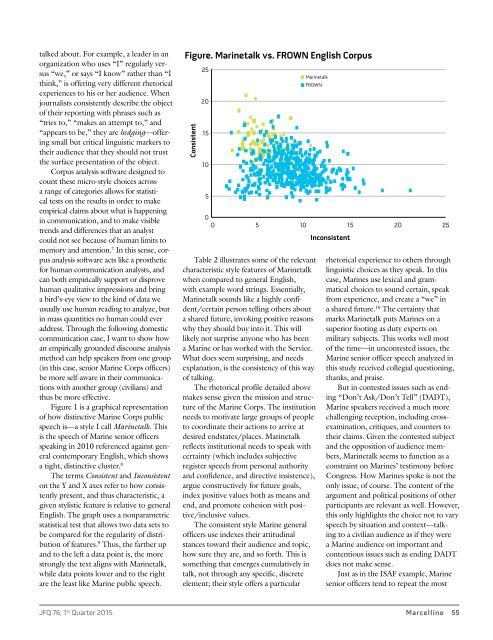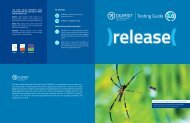jfq-76
jfq-76
jfq-76
Create successful ePaper yourself
Turn your PDF publications into a flip-book with our unique Google optimized e-Paper software.
talked about. For example, a leader in an<br />
organization who uses “I” regularly versus<br />
“we,” or says “I know” rather than “I<br />
think,” is offering very different rhetorical<br />
experiences to his or her audience. When<br />
journalists consistently describe the object<br />
of their reporting with phrases such as<br />
“tries to,” “makes an attempt to,” and<br />
“appears to be,” they are hedging—offering<br />
small but critical linguistic markers to<br />
their audience that they should not trust<br />
the surface presentation of the object.<br />
Corpus analysis software designed to<br />
count these micro-style choices across<br />
a range of categories allows for statistical<br />
tests on the results in order to make<br />
empirical claims about what is happening<br />
in communication, and to make visible<br />
trends and differences that an analyst<br />
could not see because of human limits to<br />
memory and attention. 7 In this sense, corpus<br />
analysis software acts like a prosthetic<br />
for human communication analysts, and<br />
can both empirically support or disprove<br />
human qualitative impressions and bring<br />
a bird’s-eye view to the kind of data we<br />
usually use human reading to analyze, but<br />
in mass quantities no human could ever<br />
address. Through the following domestic<br />
communication case, I want to show how<br />
an empirically grounded discourse analysis<br />
method can help speakers from one group<br />
(in this case, senior Marine Corps officers)<br />
be more self-aware in their communications<br />
with another group (civilians) and<br />
thus be more effective.<br />
Figure 1 is a graphical representation<br />
of how distinctive Marine Corps public<br />
speech is—a style I call Marinetalk. This<br />
is the speech of Marine senior officers<br />
speaking in 2010 referenced against general<br />
contemporary English, which shows<br />
a tight, distinctive cluster. 8<br />
The terms Consistent and Inconsistent<br />
on the Y and X axes refer to how consistently<br />
present, and thus characteristic, a<br />
given stylistic feature is relative to general<br />
English. The graph uses a nonparametric<br />
statistical test that allows two data sets to<br />
be compared for the regularity of distribution<br />
of features. 9 Thus, the farther up<br />
and to the left a data point is, the more<br />
strongly the text aligns with Marinetalk,<br />
while data points lower and to the right<br />
are the least like Marine public speech.<br />
Figure. Marinetalk vs. FROWN English Corpus<br />
Consistent<br />
25<br />
20<br />
15<br />
10<br />
5<br />
Marinetalk<br />
FROWN<br />
0<br />
0 5 10 15 20 25<br />
Table 2 illustrates some of the relevant<br />
characteristic style features of Marinetalk<br />
when compared to general English,<br />
with example word strings. Essentially,<br />
Marinetalk sounds like a highly confident/certain<br />
person telling others about<br />
a shared future, invoking positive reasons<br />
why they should buy into it. This will<br />
likely not surprise anyone who has been<br />
a Marine or has worked with the Service.<br />
What does seem surprising, and needs<br />
explanation, is the consistency of this way<br />
of talking.<br />
The rhetorical profile detailed above<br />
makes sense given the mission and structure<br />
of the Marine Corps. The institution<br />
needs to motivate large groups of people<br />
to coordinate their actions to arrive at<br />
desired endstates/places. Marinetalk<br />
reflects institutional needs to speak with<br />
certainty (which includes subjective<br />
register speech from personal authority<br />
and confidence, and directive insistence),<br />
argue constructively for future goals,<br />
index positive values both as means and<br />
end, and promote cohesion with positive/inclusive<br />
values.<br />
The consistent style Marine general<br />
officers use indexes their attitudinal<br />
stances toward their audience and topic,<br />
how sure they are, and so forth. This is<br />
something that emerges cumulatively in<br />
talk, not through any specific, discrete<br />
element; their style offers a particular<br />
Inconsistent<br />
rhetorical experience to others through<br />
linguistic choices as they speak. In this<br />
case, Marines use lexical and grammatical<br />
choices to sound certain, speak<br />
from experience, and create a “we” in<br />
a shared future. 10 The certainty that<br />
marks Marinetalk puts Marines on a<br />
superior footing as duty experts on<br />
military subjects. This works well most<br />
of the time—in uncontested issues, the<br />
Marine senior officer speech analyzed in<br />
this study received collegial questioning,<br />
thanks, and praise.<br />
But in contested issues such as ending<br />
“Don’t Ask/Don’t Tell” (DADT),<br />
Marine speakers received a much more<br />
challenging reception, including crossexamination,<br />
critiques, and counters to<br />
their claims. Given the contested subject<br />
and the opposition of audience members,<br />
Marinetalk seems to function as a<br />
constraint on Marines’ testimony before<br />
Congress. How Marines spoke is not the<br />
only issue, of course. The content of the<br />
argument and political positions of other<br />
participants are relevant as well. However,<br />
this only highlights the choice not to vary<br />
speech by situation and context—talking<br />
to a civilian audience as if they were<br />
a Marine audience on important and<br />
contentious issues such as ending DADT<br />
does not make sense.<br />
Just as in the ISAF example, Marine<br />
senior officers tend to repeat the most<br />
JFQ <strong>76</strong>, 1 st Quarter 2015 Marcellino 55




